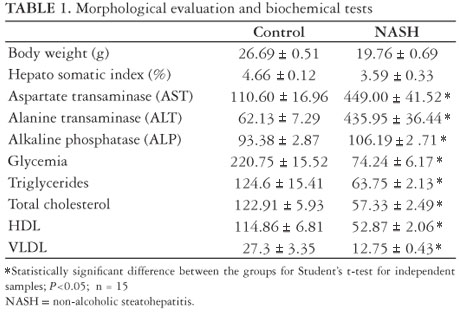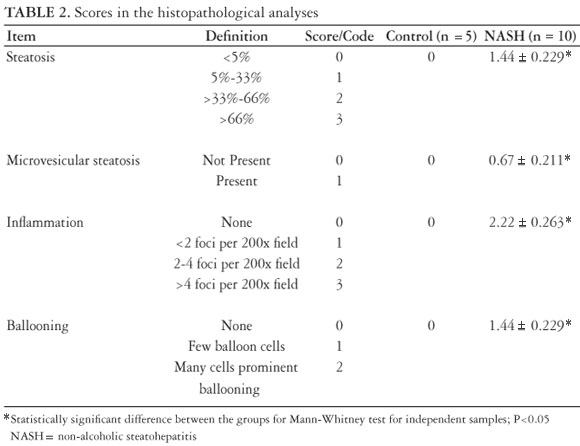CONTEXT: Non-alcoholic steatohepatitis is a disease with a high incidence, difficult diagnosis, and as yet no effective treatment. So, the use of experimental models for non-alcoholic steatohepatitis induction and the study of its routes of development have been studied. OBJECTIVES: This study was designed to develop an experimental model of non-alcoholic steatohepatitis based on a methionine- and choline-deficient diet that is manufactured in Brazil so as to evaluate the liver alterations resulting from the disorder. METHODS: Thirty male C57BL6 mice divided in two groups (n = 15) were used: the experimental group fed a methionine- and choline-deficient diet manufactured by Brazilian company PragSoluções®, and the control group fed a normal diet, for a period of 2 weeks. The animals were then killed by exsanguination to sample blood for systemic biochemical analyses, and subsequently submitted to laparotomy with total hepatectomy and preparation of the material for histological analysis. The statistical analysis was done using the Student's t-test for independent samples, with significance level of 5%. RESULTS: The mice that received the methionine- and choline-deficient diet showed weight loss and significant increase in hepatic damage enzymes, as well as decreased systemic levels of glycemia, triglycerides, total cholesterol, HDL and VLDL. The diagnosis of non-alcoholic steatohepatitis was performed in 100% of the mice that were fed the methionine- and choline-deficient diet. All non-alcoholic steatohepatitis animals showed some degree of macrovesicular steatosis, ballooning, and inflammatory process. None of the animals which were fed the control diet presented histological alterations. All non-alcoholic steatohepatitis animals showed significantly increased lipoperoxidation and antioxidant enzyme GSH activity. CONCLUSION: The low cost and easily accessible methionine- and choline-deficient diet explored in this study is highly effective in inducing steatosis and steatohepatitis in animal model, alterations that are similar to those observed in human livers.
Fatty liver; Methionine; Choline deficiency; Oxidative stress; Mice








